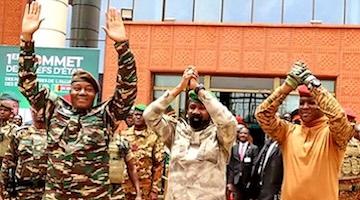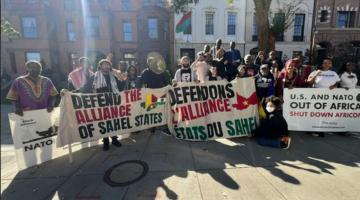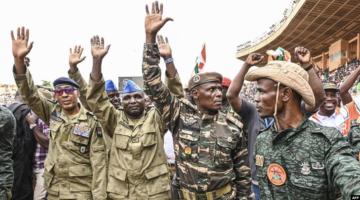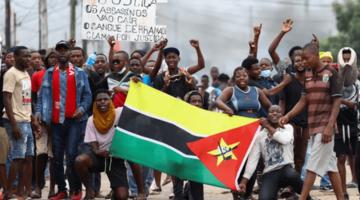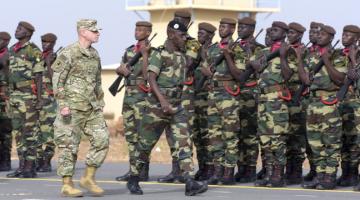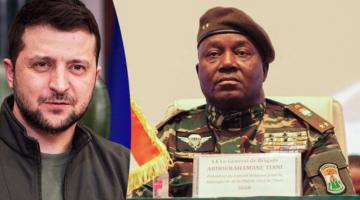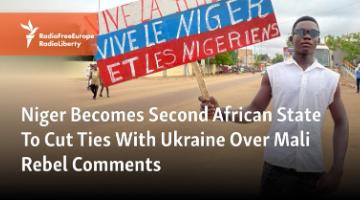Nick Turse and Sean D. Naylor
Between 2013 and 2017, U.S. special operations forces saw combat in at least 13 African countries.
“Many of these operations are taking place in countries that the U.S. government does not recognize as combat zones, but in which U.S. troops are nonetheless fighting.”
Many Americans first became aware of U.S. military operations in Africa in October 2017, after the Islamic State ambushed American troops near Tongo Tongo, Niger, killing four U.S. soldiers and wounding two others.
Just after the attack, U.S. Africa Command said U.S. troops were providing “advice and assistance” to local counterparts. Later, it would become clear that those troops — the 11-man Operational Detachment-Alpha Team 3212 — were working out of the town of Oullam with a larger Nigerian force under the umbrella of Operation Juniper Shield, a wide-ranging counterterrorism effort in northwest Africa.
Until poor weather prevented it, that team was supposed to lend support to another group of American commandos who were trying to kill or capture Islamic State leader Doundoun Cheffou as part of Obsidian Nomad II.
Juniper Shield and Obsidian Nomad II were not isolated efforts but part of a panoply of named military operations and activities U.S. forces have been conducting from dozens of bases across the northern tier of Africa. Many of these operations are taking place in countries that the U.S. government does not recognize as combat zones, but in which U.S. troops are nonetheless fighting and, in several cases, taking casualties.
“American commandos were trying to kill or capture Islamic State leader Doundoun Cheffou.”
Between 2013 and 2017, U.S. special operations forces saw combat in at least 13 African countries, according to retired Army Brig. Gen. Don Bolduc, who served at U.S. Africa Command from 2013 to 2015 and then headed Special Operations Command Africa until 2017. Those countries, according to Bolduc, are Burkina Faso, Cameroon, Central African Republic, Chad, Democratic Republic of Congo, Kenya, Libya, Mali, Mauritania, Niger, Somalia, South Sudan and Tunisia. He added that U.S. troops have been killed or wounded in action in at least six of them: Kenya, Libya, Niger, Somalia, South Sudan and Tunisia.
Yahoo News has put together a list of three dozen such operations across the continent.
The code-named operations cover a variety of different military missions, ranging from psychological operations to counterterrorism. Eight of the named activities, including Obsidian Nomad, are so-called 127e programs, named for the budgetary authority that allows U.S. special operations forces to use certain host-nation military units as surrogates in counterterrorism missions.
Used extensively across Africa, 127e programs can be run either by Joint Special Operations Command (JSOC), the secretive organization that controls the Navy’s SEAL Team 6, the Army’s Delta Force and other special mission units, or by “theater special operations forces.” These programs are “specifically designed for us to work with our host nation partners to develop small — anywhere between 80 and 120 personnel — counterterrorism forces that we’re partnered with,” said Bolduc. “They are specially selected partner-nation forces that go through extensive training, with the same equipment we have, to specifically go after counterterrorism targets, especially high-value targets.”
“U.S. troops have been killed or wounded in action in Kenya, Libya, Niger, Somalia, South Sudan and Tunisia.”
Using documents obtained via the Freedom of Information Act, interviews, published reports and a Defense Department list of named U.S. military operations that leaked online, Yahoo News put together the following list of 36 operations and activities that are (or were until recently) ongoing in Africa.
Where possible, Yahoo News has also listed the bases that support these operations, relying mostly on information sheets about those locations obtained via the Freedom of Information Act. Yahoo News does not claim that this list is comprehensive.
While the Defense Department has acknowledged the names, locations and purposes of some of these operations, others are far lower-profile. Almost all are unknown to the general public:
ARMADA SWEEP: A U.S. Navy electronic surveillance effort conducted from ships off the coast of East Africa, Armada Sweep supports the U.S. drone war in the region.
Bases used: Unknown
ECHO CASEMATE: This operation covers a series of activities in the Central African Republic. It began in 2013 as a support mission for French and African forces deployed to the troubled Central African Republic for peacekeeping purposes and continued as an advise-and-assist mission to those African peacekeeping forces. However, U.S. forces neither accompanied their partners in the field nor formally trained them. The operation also covered the introduction of contractors and Marines to secure the U.S. Embassy in Bangui and the deployment of a small U.S. special operations contingent to assist the U.S. ambassador in missions to counter the Lord’s Resistance Army. In the first days of the operation, the U.S. military airlifted hundreds of Burundian troops, tons of equipment and more than a dozen military vehicles into the Central African Republic, according to Africom. The U.S. military continued transporting French forces in and out of the Central African Republic, and the mission was still underway in early 2018.
Base used: Abeche, Chad
EXILE HUNTER: One of a family of similarly named counterterrorism efforts that U.S. special operations forces have conducted in East Africa. Exile Hunter was a 127e program in which elite U.S. troops trained and equipped an Ethiopian force for counterterrorism missions in Somalia. Bolduc says he shut it down in 2016 because the Ethiopian government was uncomfortable about the force not falling under its command. However, a February 2018 Defense Department list of named operations suggests it had been resurrected.
Bases used: Camp Lemonnier, Djibouti
JUKEBOX LOTUS: Operation Jukebox Lotus began as the crisis response to the September 2012 attack in Benghazi, Libya, that killed U.S. Ambassador J. Christopher Stevens and three other Americans, but continued until at least 2018. It gives Africa Command broad authority to conduct a variety of operations in Libya as required and is specific to neither special operations nor counterterrorism.
Bases used: Faya Largeau and N’Djamena, Chad; Air Base 201, Agadez, Niger
JUNCTION RAIN: A maritime security effort in the Gulf of Guinea involving African and U.S. Coast Guard boarding teams operating from U.S. Navy ships or those of African forces. In 2016, the hybrid teams conducted 32 boardings, resulting in $1.2 million in fines levied for more than 50 maritime violations, as well as the recovery of a diesel fuel tanker that had been seized by pirates. Last year, operations with the Senegalese and Cabo Verdean navies resulted in at least 40 boardings — mostly of fishing vessels — and $75,000 in fines handed down for two fishing violations.
Base used: Dakar, Senegal
JUNCTION SERPENT: A surveillance effort in Libya that, as part of the 2016 campaign of airstrikes against Islamic State positions in the Libyan city of Sirte, gave Joint Special Operations Command specific authorities to coordinate assets in order to develop targeting information for the campaign
Bases used: Unknown
JUNIPER MICRON: In 2013, after France launched a military intervention against Islamists in Mali code-named Operation Serval, the U.S. began Operation Juniper Micron, which involved airlifting French soldiers and supplies into that former French colony, flying refueling missions in support of French airpower, and assisting allied African forces. Juniper Micron was ongoing as of October 2018, with plans for it to continue in the future.
Bases used: Ouagadougou, Burkina Faso; Istres-Le Tube Air Base, France; Bamako and Gao, Mali; Air Base 201 (Agadez), Arlit, Dirkou, Madama and Niamey, Niger; Dakar, Senegal
JUNIPER NIMBUS: Juniper Nimbus is a long-running operation aimed at supporting the Nigerian military campaign against Boko Haram.
Bases used: Ouagadougou, Burkina Faso; N’Djamena, Chad; Arlit, Dirkou and Madama, Niger
JUNIPER SHIELD: The umbrella operation for the mission that resulted in the deadly ambush in Niger, Juniper Shield is the United States’ centerpiececounterterrorism effort in northwest Africa and covers 11 nations: Algeria, Burkina Faso, Cameroon, Chad, Mali, Mauritania, Morocco, Niger, Nigeria, Senegal and Tunisia. Under Juniper Shield, U.S. teams rotate in every six months to train, advise, assist and accompany local partner forces to conduct operations against terrorist groups, including ISIS-West Africa, Boko Haram and al Qaida and its affiliates.
Bases used: Ouagadougou, Burkina Faso; Garoua and Maroua, Cameroon; Bangui, Central African Republic; Faya Largeau and N’Djamena, Chad; Bamako and Gao, Mali; Nema and Ouassa, Mauritania; Air Base 201 (Agadez), Arlit, Diffa, Dirkou, Madama and Niamey, Niger; Dakar, Senegal
JUPITER GARRET: A JSOC operation aimed at high-value targets in Somalia, Jupiter Garret first came to light in a 2012 Washington Post article. It was ongoing as of February 2018
Bases used: Camp Lemonnier and Chebelley, Djibouti; Laikipia, Manda Bay and Wajir, Kenya; Baidoa, Baledogle, Bosasso, Galcayo, Kismayo and Mogadishu, Somalia
JUSTIFIED SEAMOUNT: Another counter-piracy effort in the waters off East Africa
Bases used: Chebelley, Djibouti; Laikipia, Mombasa and Wajir, Kenya; Victoria, Seychelles; Baidoa, Baledogle, Kismayo and Mogadishu, Somalia
KODIAK HUNTER: A 127e program in which U.S. special operators trained and equipped a Kenyan force to conduct counterterrorism missions in Somalia
Base used: Camp Lemonnier, Djibouti; Manda Bay, Kenya
MONGOOSE HUNTER: A 127e program in which U.S. special operations forces trained and equipped a Somali force for counterterrorism missions against al-Shabab
Base used: Camp Lemonnier, Djibouti; Baledogle, Somalia
NEW NORMAL: An Africa-wide crisis response capability established by the U.S. military after the 2012 attack on the U.S. Consulate in Benghazi, Libya
Bases used: Camp Lemonnier, Djibouti; Libreville, Gabon; Accra, Ghana; Dakar, Senegal; Entebbe, Uganda
NIMBLE SHIELD: A low-profile effort targeting Boko Haram and ISIS-West Africa
Bases used: Douala, Garoua and Maroua, Cameroon; Bangui, Central African Republic; N’Djamena, Chad; Diffa, Dirkou, Madama and Niamey, Niger
OAKEN SONNET I-III: A series of three contingency operations in South Sudan. Oaken Sonnet I was the difficult 2013 rescue of U.S. personnel from that country at the beginning of its civil war. Oaken Sonnet II took place in 2014 and Oaken Sonnet III in 2016.
Base used: Juba, South Sudan
OAKEN STEEL: The reinforcement of the U.S. Embassy in Juba, South Sudan, to protect State Department personnel during a conflict between rival factions in that country’s civil war, Operation Oaken Steel, which ran from July 12, 2016, to Jan. 26, 2017, saw U.S. forces deploy to Uganda to provide for rapid crisis response during the unrest.
Bases used: Camp Lemonnier, Djibouti; Moron Air Base, Spain; Entebbe, Uganda
OBJECTIVE VOICE: In 2010, the first head of Africa Command, Army Gen. William “Kip” Ward, told the Senate Armed Services Committee that Operation Objective Voice was an “information operations effort to counter violent extremism by leveraging media capabilities in ways that encourage the public to repudiate extremist ideologies.” Coordinated with other government agencies, this propaganda effort included “youth peace games” in Mali, a film project in northern Nigeria, and, according to his successor, Army Gen. Carter Ham, a “variety of messaging platforms, such as the African Web Initiative, to challenge the views of terrorist groups.” Objective Voice continues today.
Bases used: Garoua and Maroua, Cameroon; Bangui, Central African Republic; Abeche, Faya Largeau and N’Djamena, Chad; Bamako and Gao, Mali; Nema and Ouassa, Mauritania; Air Base 201 (Agadez), Arlit and Madama, Niger; Dakar, Senegal; Entebbe, Uganda
OBLIQUE PILLAR: A program to provide private contractor helicopter support to Navy SEAL-advised units of the Somali National Army fighting al-Shabab in Somalia. The operation was in existence as of February 2018.
Bases used: Camp Lemonnier, Djibouti; Mombasa and Wajir, Kenya; Baidoa, Baledogle, Kismayo and Mogadishu, Somalia; Entebbe, Uganda.
OBSERVANT COMPASS: An operation to capture or kill Joseph Kony and eradicate his Lord’s Resistance Army, a militia that has committed atrocities since the 1980s. In 2017, with around $780 million spent on the operation, and Kony still in the field, the United States wound down Observant Compass and shifted its forces elsewhere. But the operation didn’t completely disband, according to the Defense Department. “U.S. military forces supporting Operation Observant Compass transitioned to broader scope security and stability activities that continue the success of our African partners,” Pentagon spokesperson Cmdr. Candice Tresch told Yahoo News.
Bases used: Obo, Central African Republic; Abeche, Chad; Dungu, Democratic Republic of Congo; Juba and Nzara, South Sudan; Entebbe, Uganda
OBSIDIAN LOTUS: A 127e activity concentrated on Libya, in which U.S. commandos trained and equipped Libyan special operations forces battalions. One of those units ended up under the control of renegade warlord Gen. Khalifa Haftar, according to Bolduc.
Bases used: Unknown
OBSIDIAN MOSAIC: A 127e counterterrorism effort focused on Mali.
Bases used: Unknown.
OBSIDIAN NOMAD I and II: Two 127e counterterrorism programs in Niger: Obsidian Nomad I in Diffa and Obsidian Nomad II in Arlit. The operational name emerged in the wake of the October 2017 ambush in Niger that killed four U.S. soldiers.
Bases used: Arlit and Diffa, Niger
OCTAVE ANCHOR: A psychological operation focused on Somalia
Bases used: Camp Lemonnier, Djibouti; Mogadishu, Somalia
OCTAVE SHIELD: An Africa Command psychological operation focused on Somalia, carried out under the aegis of Combined Joint Task Force-Horn of Africa, based at Camp Lemonnier in Djibouti.
Bases used: Camp Lemonnier and Chebelley, Djibouti; Laikipia, Manda Bay, Mombasa and Wajir, Kenya; Victoria, Seychelles; Baidoa, Baledogle, Bosasso, Galcayo, Kismayo and Mogadishu, Somalia; Entebbe, Uganda.
OCTAVE SOUNDSTAGE: A JSOC psychological operation focused on Somalia.
Bases used: Unknown
OCTAVE STINGRAY: A JSOC psychological operation focused on Somalia
Base used: Mogadishu, Somalia
OCTAVE SUMMIT: A JSOC psychological operation focused on Somalia
Base used: Camp Lemonnier, Djibouti
ODYSSEY LIGHTNING: The campaign of special operations-directed airstrikes against Islamic State targets in Sirte, Libya, between August and December 2016
Base used: Naval Air Station, Sigonella, Italy
ODYSSEY RESOLVE: Another component of the 2016 special operations campaign of air strikes against the Islamic State in the Libyan city of Sirte,Operation Odyssey Resolve consists of intelligence, surveillance and reconnaissance flights. It was ongoing as of February 2018.
Bases used: Ouagadougou, Burkina Faso; Faya Largeau, Chad; Benina and Misrata, Libya; Bamako and Gao, Mali; Nema and Ouassa, Mauritania; Arlit and Niamey, Niger; Dakar, Senegal; Bizerte, Tunisia; Entebbe, Uganda
PALADIN HUNTER: A 127e counterterrorism program in the semi-autonomous Puntland region of Somalia.
Bases used: Camp Lemonnier, Djibouti; Bosasso and Galcayo, Somalia
RAINMAKER: A highly sensitive classified signals intelligence effort
Bases used: Chebelley, Djibouti; Baidoa, Baledogle, Kismayo and Mogadishu, Somalia
ULTIMATE HUNTER: A 127e counterterrorism program using a U.S.-trained, equipped and directed Ugandan force in Somalia.
Bases used: Camp Lemonnier, Djibouti.
*Information on which operations the following bases support was partially redacted: Douala, Garoua and Maroua (all Cameroon); N’Djamena, Chad; Bangui, Central African Republic; Diffa, Dirkou, Madama and Niamey (all Niger). The list of operations supported by Tobruk and Tripoli (both Libya) was fully redacted. Other data were likely withheld completely.
This article previously appeared in Yahoo News.
COMMENTS?
Please join the conversation on Black Agenda Report's Facebook page at http://facebook.com/blackagendareport
Or, you can comment by emailing us at comments@blackagendareport.com


